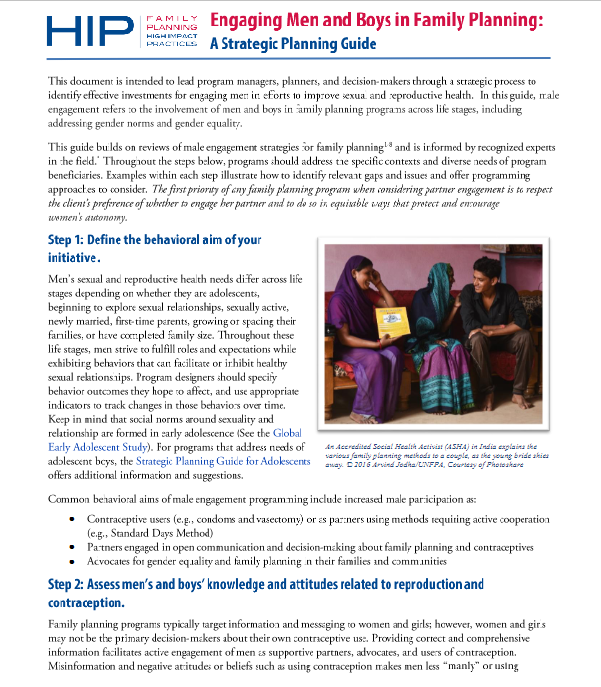
Resource Type:
Technical Guide
Region/Country:
Global
Primary Audience:
Non Governmental Organization (NGO) Staff
Technical Area:
Sexual and Reproductive Health, Family Planning
SBC Approach:
Social and Structural Change, Gender-transformative
Engaging Men and Boys in Family Planning: A Strategic Planning Guide
This document is intended to lead program managers, planners, and decision makers through a strategic process to identify effective investments for engaging men in efforts to improve sexual and reproductive health. In this guide, male engagement refers to the involvement of men and boys in family planning programs across life stages, including addressing gender norms and gender equality.
Access this Resource
Organization/author: High-Impact Practices in Family Planning
Year: 2018Language: French, Portuguese, Spanish, English
Know, Care, Do Theory of Change (learn more)
Components of Engagement:
 Know Know about FP/SRH by having factual knowledge about FP/SRH services and methods and harmful gender norms and expectations.
Know Know about FP/SRH by having factual knowledge about FP/SRH services and methods and harmful gender norms and expectations. Care Care about FP/SRH by assuming responsibility for their personal health and reproduction and accountability for supporting their partners’ reproductive priorities and needs.
Care Care about FP/SRH by assuming responsibility for their personal health and reproduction and accountability for supporting their partners’ reproductive priorities and needs. Do Do supportive actions for FP/SRH by taking concrete steps to communicate and help achieve reproductive intentions and goals from themselves and in support of their partners.
Do Do supportive actions for FP/SRH by taking concrete steps to communicate and help achieve reproductive intentions and goals from themselves and in support of their partners.
Role in Engagement:
Agent of ChangeAs agents of change who actively aim to improve outcomes for themselves, their partners, their families, and their communities.
, PartnerAs partners in their relationships regarding FP/SRH issues and in challenging and addressing gender inequality and inequitable gender norms and roles.
, Client/UserAs clients or users of FP/SRH services with unique priorities, needs, and preferences that should be met by programs.

